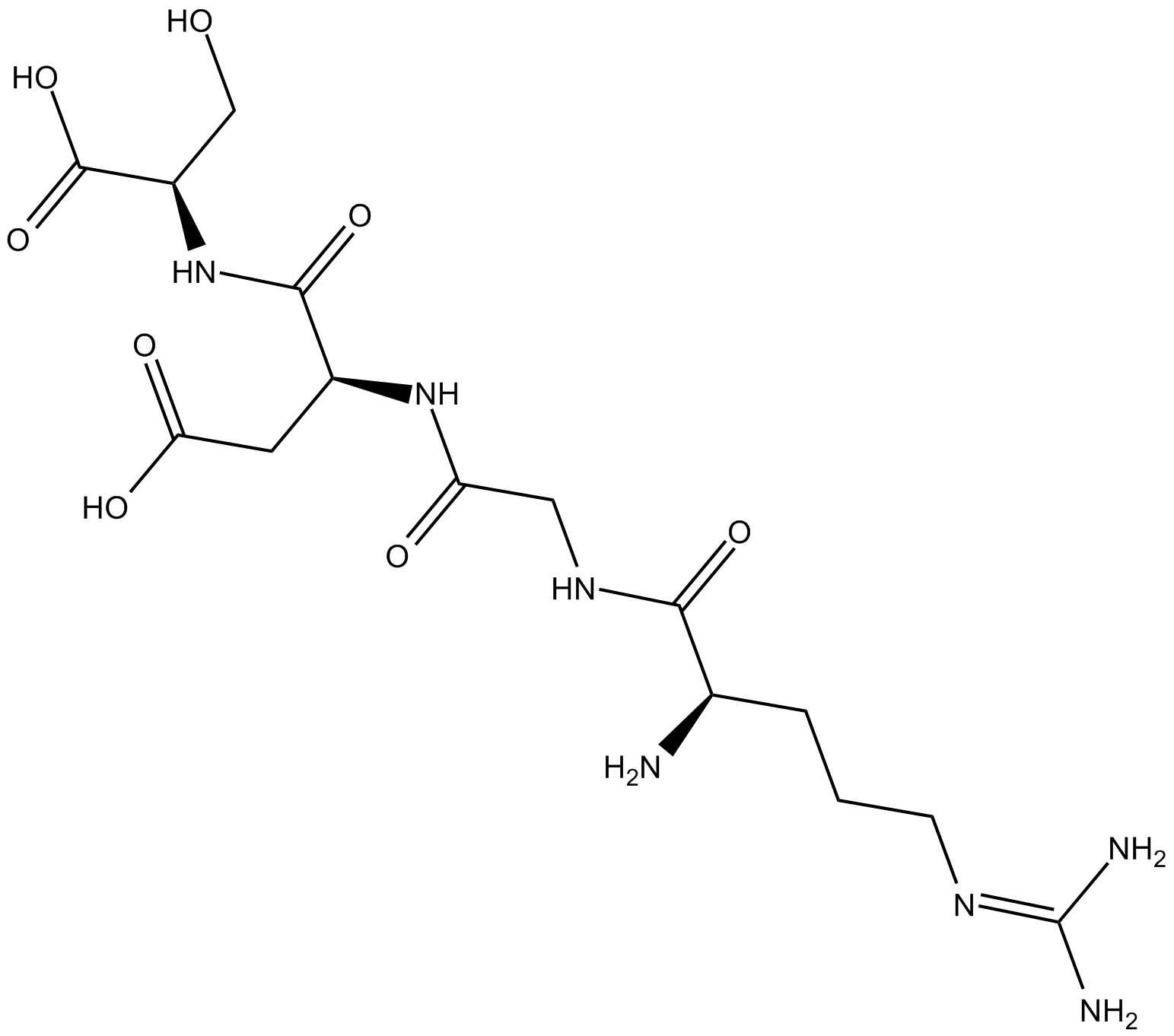RGDS peptide (Synonyms: Fibronectin Inhibitor, HArgGlyAspSerOH) |
| Catalog No.GC16385 |
El péptido RGDS es una secuencia de uniÓn a integrina que inhibe la funciÓn del receptor de integrina.
Products are for research use only. Not for human use. We do not sell to patients.

Cas No.: 91037-65-9
Sample solution is provided at 25 µL, 10mM.
Arg-Gly-Asp-Ser is an integrin binding sequence that inhibits integrin receptor function, decreases systemic inflammation via inhibition of collagen-triggered activation of leukocytes and attenuates expression of inflammatory cytokines, iNOS and MMP-9.
The Arg-Gly-Asp-Ser-modified surface causes up-regulation of αvβ3 integrin. Attachment to the Arg-Gly-Asp-Ser-treated membrane completely abolishes apoptosis induced by staurosporine, the Ca2+·Pi ion pair, and sodium nitroprusside. Arg-Gly-Asp-Ser-dependent resistance to apoptosis is eliminated, when the activity of the phosphatidylinositol 3-kinase pathway is inhibited[1]. Arg-Gly-Asp-Ser interacts with survivin, as well as with procaspase-3, -8 and -9. Arg-Gly-Asp-Ser-peptide binding to survivin is found to be specific, at high affinity (Kd 27.5 μM) and locates at the survivin C-terminus. Arg-Gly-Asp-Ser-survivin interaction appears to play a key role, since Arg-Gly-Asp-Ser lost its anti-mitogenic effect in survivin-deprived cells with a specific siRNA[4].
Arg-Gly-Asp-Ser (2.5 or 5 mg/kg, 1 h before LPS) significantly inhibits LPS-induced MMP-9 activity in BAL fluid 4 h post-LPS. Arg-Gly-Asp-Ser (1, 2.5 or 5 mg/kg, i.p.) administers 1 h before LPS inhibited LPS-induced increases in TNF-α and MIP-2 levels in BAL fluid at 4 h post-LPS[2]. Arg-Gly-Asp-Ser peptide significantly reduces tumor necrosis factor (TNF)-α and macrophage inflammatory protein (MIP)-2 production, and decreases myeloperoxidase (MPO) and NF-κB activity[3].
References:
[1]. Grigoriou V, et al. Apoptosis and survival of osteoblast-like cells are regulated by surface attachment. J Biol Chem. 2005 Jan 21;280(3):1733-9.
[2]. Moon C, et al. Synthetic RGDS peptide attenuates lipopolysaccharide-induced pulmonary inflammation by inhibiting integrin signaled MAP kinase pathways. Respir Res. 2009 Mar 9;10:18.
[3]. Yin X, et al. Synthetic RGDS peptide attenuated lipopolysaccharide/D-galactosamine-induced fulminant hepatic failure in mice. J Gastroenterol Hepatol. 2014 Jun;29(6):1308-15.
[4]. Aguzzi MS, et al. Intracellular targets of RGDS peptide in melanoma cells. Mol Cancer. 2010 Apr 22;9:84.
Average Rating: 5 (Based on Reviews and 25 reference(s) in Google Scholar.)
GLPBIO products are for RESEARCH USE ONLY. Please make sure your review or question is research based.
Required fields are marked with *




















